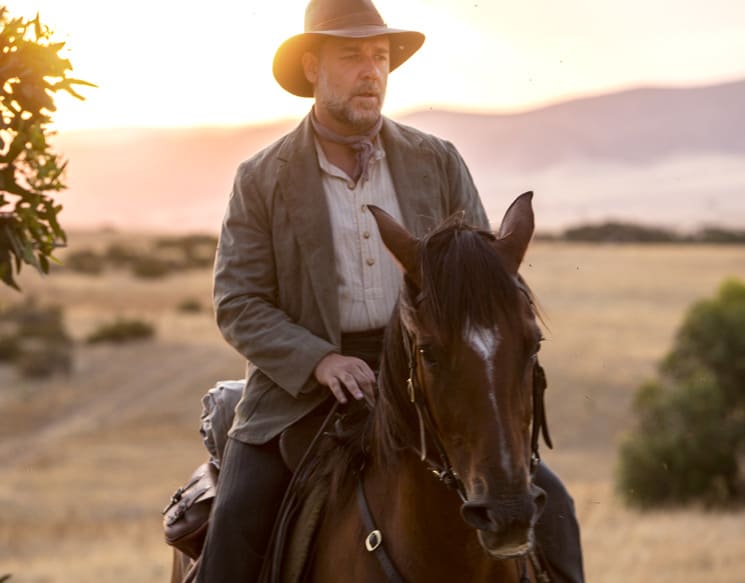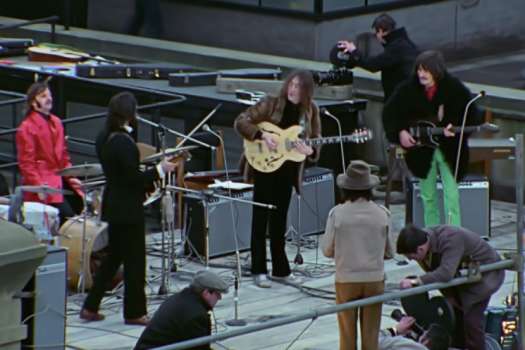Before getting into plot specifics, The Water Diviner, mercurial actor Russell Crowe's feature directorial debut, gives its title some context. Joshua Connor (Crowe) wanders through the Australian desert dowsing for water, digging himself a well when he finds a choice spot. It's implied that Connor has a sixth sense about these things, which is visualized mostly through slow motion footage and fairly narcissistic shows of Crowe squinting his eyes while looking into the air. He's our hero and, as evidenced by his ability to single-handedly dig a well in a 30-second montage, he'll stop at nothing to fulfil his ambitions.
Appropriately, the tone of The Water Diviner is sombre. Shortly after our protagonist is introduced, his wife (Jacqueline McKenzie) drowns herself (irony) in a fit of grief over their three sons who were killed at the battle of Gallipoli. Left with nothing, Connor sets out to Turkey to find his sons — who were surely buried in a mass grave — utilizing his handy knack for perceiving what lies beneath the earth's surface.
Like most actors-turned-directors, Crowe's approach to the material is exceedingly traditionalist. Save the painfully overused slow-motion sequences, there's very little stylization beyond Frank Capra-variety cinema. Crowe's vision of The Water Diviner is epic, channelling classic Hollywood cinema and the general western template, which, in Australian terms, tends to have more of a defeatist (see the works of John Hillcoat) sensibility.
But that doesn't mean that this tale of human will and determination is all dreary and despondent. Shortly after arriving in Turkey, Connor finds lodging at a hotel owned by Ayshe (Olga Kurylenko), a mother and widow hiding the death of her husband from her precocious son Orhan (Dylan Georgiades). Unsurprisingly, this dynamic allows Connor to take on the role of father figure to a boy in need while striking up a thorny flirtation with a woman whose culture and religious beliefs frown on such fraternization.
In theory, the basic story could pull a few heartstrings while respectfully addressing the many lives lost during WWI, and in a broad sense, it does — it's just that the tactics are so manipulative and the situations so hackneyed and contrived that it's difficult to take seriously. For example, the flashback scene in which Connor's sons are killed is used nearly a dozen times throughout the film. On its own, it's a powerful scene, but when juxtaposed with repeated scenes of Russell Crowe staring off into the abyss, it turns into comedy around the sixth or seventh time. There's also never a palatable sense of humanity or chemistry between Connor and Ayshe, which mainly stems from the fact that she's written as a very flat, Turkish June Cleaver, wandering around in an apron and scolding her son for being too unruly.
It also doesn't help that the themes of pushing forward in the face of tragedy and never giving up hope aren't treated with any sense of complexity. The most complex thing going on here is an eventual allegiance between Connor and a man on the other side of the Gallipoli Campaign, showing that human empathy in the face of tragedy can overcome even the most challenging of obstacles.
It's all pretty standard for the genre, which isn't helped by the rather bland and ineffective approach that Crowe takes with the material. Perhaps next time, Crowe will make some effort to develop the secondary characters sharing the screen with him.
(eOne)Appropriately, the tone of The Water Diviner is sombre. Shortly after our protagonist is introduced, his wife (Jacqueline McKenzie) drowns herself (irony) in a fit of grief over their three sons who were killed at the battle of Gallipoli. Left with nothing, Connor sets out to Turkey to find his sons — who were surely buried in a mass grave — utilizing his handy knack for perceiving what lies beneath the earth's surface.
Like most actors-turned-directors, Crowe's approach to the material is exceedingly traditionalist. Save the painfully overused slow-motion sequences, there's very little stylization beyond Frank Capra-variety cinema. Crowe's vision of The Water Diviner is epic, channelling classic Hollywood cinema and the general western template, which, in Australian terms, tends to have more of a defeatist (see the works of John Hillcoat) sensibility.
But that doesn't mean that this tale of human will and determination is all dreary and despondent. Shortly after arriving in Turkey, Connor finds lodging at a hotel owned by Ayshe (Olga Kurylenko), a mother and widow hiding the death of her husband from her precocious son Orhan (Dylan Georgiades). Unsurprisingly, this dynamic allows Connor to take on the role of father figure to a boy in need while striking up a thorny flirtation with a woman whose culture and religious beliefs frown on such fraternization.
In theory, the basic story could pull a few heartstrings while respectfully addressing the many lives lost during WWI, and in a broad sense, it does — it's just that the tactics are so manipulative and the situations so hackneyed and contrived that it's difficult to take seriously. For example, the flashback scene in which Connor's sons are killed is used nearly a dozen times throughout the film. On its own, it's a powerful scene, but when juxtaposed with repeated scenes of Russell Crowe staring off into the abyss, it turns into comedy around the sixth or seventh time. There's also never a palatable sense of humanity or chemistry between Connor and Ayshe, which mainly stems from the fact that she's written as a very flat, Turkish June Cleaver, wandering around in an apron and scolding her son for being too unruly.
It also doesn't help that the themes of pushing forward in the face of tragedy and never giving up hope aren't treated with any sense of complexity. The most complex thing going on here is an eventual allegiance between Connor and a man on the other side of the Gallipoli Campaign, showing that human empathy in the face of tragedy can overcome even the most challenging of obstacles.
It's all pretty standard for the genre, which isn't helped by the rather bland and ineffective approach that Crowe takes with the material. Perhaps next time, Crowe will make some effort to develop the secondary characters sharing the screen with him.




